Launching a startup in 2025 isn’t cheap. The average cost just over $28,000 with some industries costing even more - and this is before you even open your doors to the public.
Most founders can’t afford to waste time or money. Every hire, every subscription, every decision has to pay off.
Startups move at speed. You need customer relationship management that’s lean and fast to set up – not another platform weighing you down with features you’ll never use or costs you can’t justify.
This guide covers the best CRM software for startups right now, highlighting the tools that help young companies stay organized, convert more leads, and scale.
Why every startup needs a CRM
It’s tempting to push CRM adoption down the road – until you realize what it’s costing you to wait.
Most startups are already using one (or wish they had).
Nearly all tech companies (94%) and seven in ten small businesses rely on a CRM to organize customer data, track interactions, and keep everyone on the same page. If your competitors aren’t running spreadsheets, you shouldn’t be, either.
It’s about scaling smart.
Companies using CRM are 86% more likely to smash their sales goals, with revenue jumping by as much as 30% after rollout. For founders, that means less guesswork and no lost leads when you’re busy chasing growth.
Retention, not just acquisition, wins the long game.
Startups that use CRM don’t just close more new business – they also see user retention jump by 25% and customer lifetime value rise by 20%. No more churn due to dropped follow-ups or forgotten promises!
You buy back time (and sanity).
CRMs save your team precious hours every week. Admin shrinks, and sales cycles are up to two weeks shorter, so you can get back to building or launching your next feature.
Lower costs, higher ROI.
With CRM, nearly half of businesses reported a drop in customer acquisition costs by up to 20%. It’s about earning more with the customers you already have.
The market is voting with its wallet.
The CRM for startups market is projected to nearly triple in the next decade. Why? Because startups that implement CRM get better, faster, and more sustainable results.
Persuaded yet?
Top CRM features for startups
It’s easy to drown in a sea of CRM features, especially when every platform promises the world.
But as a startup, you don’t need a CRM system overloaded with tools you’ll never use. You need a CRM that fits where you are right now and supports the way your team works.

To make your selection easier, we’ve split the features into two camps: the non-negotiables you can’t grow without, and the nice-to-haves for when you’re ready to scale.
Must-have CRM features for startups
Flexible contact and deal tracking
Early-stage startups talk to investors, beta users, prospects, and partners – all at once. You need a CRM that tracks any kind of relationship. It should help you nurture leads and ensure that you never lose track of important conversations.
A pipeline that matches your actual sales (or funding) journey
Your process probably isn’t “lead > demo > close”. Sometimes you’re running pilots, sorting through admin, or pitching VCs. Your CRM should let you label and move deals however your process works, so it supports early sales and partnerships as you grow.
Quick task reminders and follow-up nudges
Startup days are chaos: between product fires and sales calls, it’s easy to drop balls. The right CRM pings you to reconnect after a demo, remind an investor about due diligence, or follow up with a pilot customer before they go dark.
Easy integrations with what you already use
You don’t have time for tool soup. The best CRM for startups plugs into Gmail, Slack, Google Calendar, or whatever your team already lives in, so updates and context show up without manual entry.
DIY setup and customization
No developer? No problem. Startups pivot fast, and your CRM should too. Add custom fields or stages when your business model changes, without waiting for an IT ticket or paying for extra support.
Nice-to-have CRM features for startups
Workflow automation to save founder time
Automate busywork, like follow-up emails or meeting scheduling, so your lean team can focus on fundraising or growth.
Real-time dashboards and reporting
Get instant insights into pipeline health, conversion rates, or investor outreach. Know what’s working now, so you don’t waste a month chasing dead ends.
Mobile-first access for hustling on the go
Whether you’re demoing at a conference, traveling for a pitch, or just working from a café, you should always have your latest contacts and deals in your pocket.
Simple scaling when the team grows
When you go from founder-led sales to building out a team, your CRM shouldn’t slow you down. Look for easy user management and permissions to bring in a sales hire or SDR in minutes.
Top CRM software for startups in 2025
Below, we break down the best CRM options for startups in 2025, so you can skip the guesswork and pick a tool that’ll help you grow from day one.
Capsule CRM
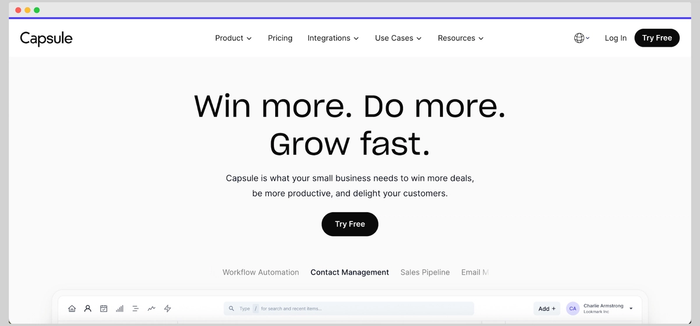
If you’re building a startup, you need a CRM that matches your pace. With Capsule, you get up and running in minutes, and suddenly, your contacts aren’t scattered across spreadsheets, inboxes, and memory.
Why startups choose Capsule
- Fast, frictionless onboarding. Setup takes minutes, not days. The interface is intuitive and built for daily use.
- Custom pipelines and project tracking. You can adapt Capsule to your real sales process, not the other way around. Move opportunities with drag-and-drop speed, track every milestone, and never lose sight of what’s next.
- All your conversations, files, and follow-ups live in one place. Capsule becomes your single source of truth as you build your first partnerships or move through funding rounds.
- Built-in integrations for real-world tools, including Gmail, Outlook, Xero, Mailchimp, Slack, QuickBooks, and dozens more. Capsule connects with what you already use, you don’t have to reinvent the stack.
Pricing
Free for up to 2 users and 250 contacts. Paid plans start at $18/user/month.
What startups say about Capsule
Capsule isn’t trying to be everything. It’s the CRM startups actually finish setting up, actually use, and actually stick with as they grow.
Don’t just take our word for it. Founders and teams keep coming back with the same story: Capsule fits, it grows with you, and it just works. Here are a few straight-from-the-source reviews that tell the real story:
Team have not wanted to use CRM systems before but successful pilot with Capsule convinced them it's a good thing!

Capsule was exactly what we needed in the early stages of our start up.

I've implemented it in major international aid charities, replacing CRMs which are far too complex. I also recommend it to start-ups because who has time for a tricky implementation phase?

I have been using Capsule for just under a year. Looked at many but found it fitted my business needs as a start up.

Hubspot CRM
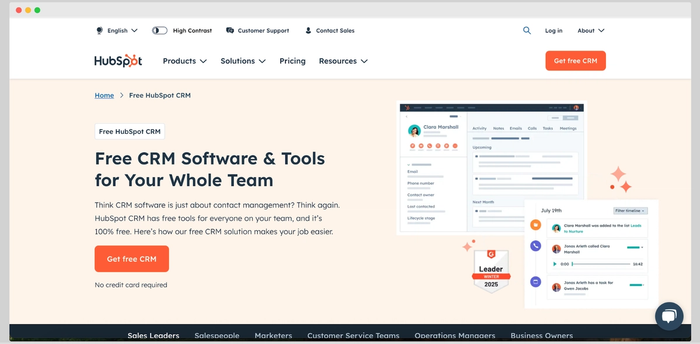
HubSpot CRM is often one of the first stops for startups searching for a free system to organize contacts and track deals. Its wide adoption means you’ll probably hear about it early on, and it’s easy enough to get started, though the learning curve can catch some teams by surprise.
Key features for startups
- Customizable pipeline to visualize sales progress
- Tools for email templates, meeting links, and basic activity tracking
- Integrates with common startup tools, including Google Workspace, Stripe, and Slack
Pricing
The basic CRM is free, making it approachable for new startups. HubSpot’s paid plans start at $20/month and add marketing automation, but extra features can increase your costs quickly.
Considerations
- The interface can feel crowded for small teams who just want the essentials, and some features may go unused.
- Setting up automation or more complex reporting requires extra time and technical know-how.
- As your business grows, the price jumps when you move to paid tiers, especially if you need support or advanced functionality.
- HubSpot works best for teams who plan to expand into its larger suite; for startups looking to keep things lean and simple, it may be more than you need.
Pipedrive
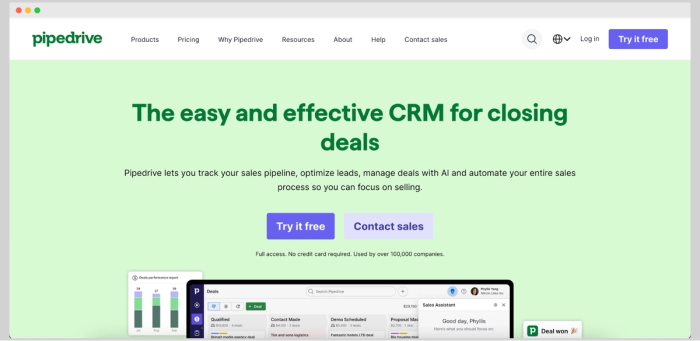
Pipedrive stands out among sales-focused CRMs for its simplicity. Founders who want a straightforward way to overview their pipeline – and don’t need a full suite of marketing or support tools – often gravitate here.
Key features for startups
- Deal “rotting” alerts to help you spot when opportunities have stalled too long
- Quick deal creation directly from your email or calls, saving you extra clicks
- Activity scheduler for booking calls and reminders
- Revenue forecasting tools based on your current pipeline health
Pricing
Pipedrive pricing starts at $14.90 per user/month. That price gives you the basics: pipeline management, activity scheduling, and mobile access. More advanced automation and insights live in higher plans.
Considerations
- Pipedrive is focused on sales, so you won’t find built-in marketing automation or customer support features.
- If your startup needs project management or wants to track more than just deals, you’ll need to connect third-party apps – or look elsewhere.
- Reporting is more complex in upper-tier plans, so scaling startups may find themselves upgrading sooner than expected.
Zoho CRM
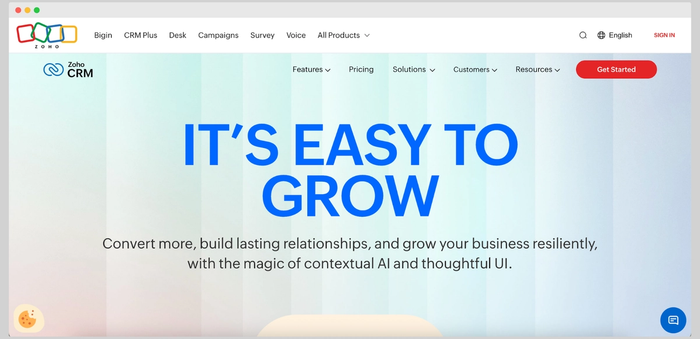
Trying to find a CRM that doesn’t box you in as you experiment with new offers, pricing, or even whole business models? Zoho CRM is a favorite for startups that want room to adapt their CRM. It’s less of a single tool, instead, its features can be dialed up or down as your needs shift.
Key features for startups
- Automation for follow-ups and lead assignments
- Easy add-ons for things like finance, support, or HR, letting you plug gaps without leaving Zoho’s ecosystem
- AI-powered suggestions (in higher tiers) that help you spot leads or deals worth another call
Pricing:
Zoho is free for up to 3 users, with paid plans starting at $14 per user/month.
Considerations
- The interface can feel cluttered, especially if your team prefers modern, minimalist design.
- Connecting multiple Zoho tools sometimes means wrestling with settings and workflows.
- With so many options, it’s easy for small teams to spend more time customizing than actually selling.
Freshales (Freshworks CRM)
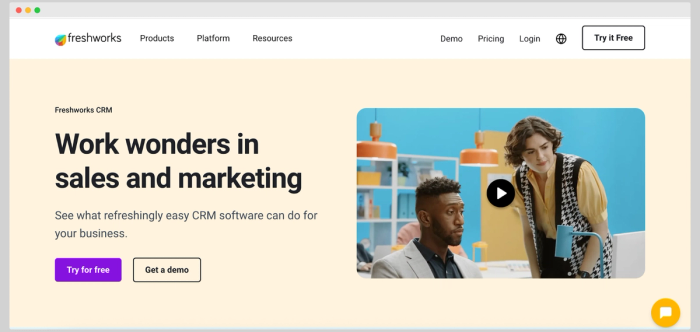
Freshsales gives startups a simple way to organize sales and communication without drowning in extra features. If your team wants to handle calls, emails, and sales activity from one place, this tool covers the basics right out of the box.
Key features for startups
- Contact and deal tracking with AI-based lead scoring
- Built-in email, phone, and chat
- An AI assistant that suggests next steps and helps manage data
Pricing
Start with a free plan for simple needs. If you need more, the entry paid plan is $15 per user per month and adds things like built-in calling and advanced automation.
Considerations:
- Some of the smarter automation and AI tools are only available on higher-tier plans.
- If your startup already relies on a stack of niche tools, integrations might not be sufficient.
- Once you add complexity or scale, you may find yourself looking at paid upgrades sooner than you planned.
Copper CRM
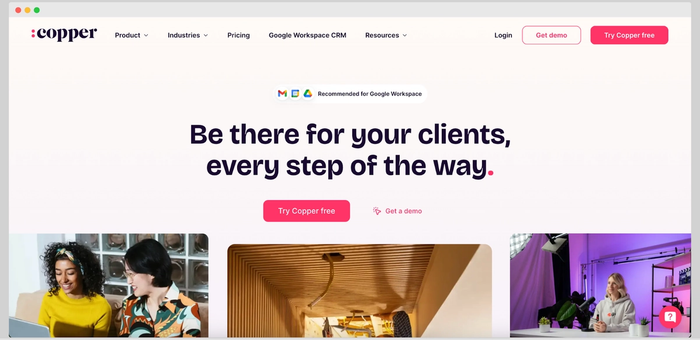
If your team already lives in Gmail, Copper offers a way to manage leads and deals without leaving your inbox. It centralizes sales activity for teams that rely on Google tools.
Key features for startups
- Manage contacts and deals directly in Gmail – no need to switch platforms
- Automatic capture of contact details and communications from email and calendar
- Connects with Google Drive and Sheets for easy access to documents
Pricing
Copper CRM pricing starts at $23 per user per month for Gmail integration, pipeline tracking, and reporting.
Considerations
- Most valuable for teams fully committed to Google Workspace
- Limited features for marketing or customer support – focus is on sales
- Can feel restrictive if you want to mix in tools outside the Google ecosystem
- Not ideal if you expect your workflow or software stack to change frequently
Streak CRM
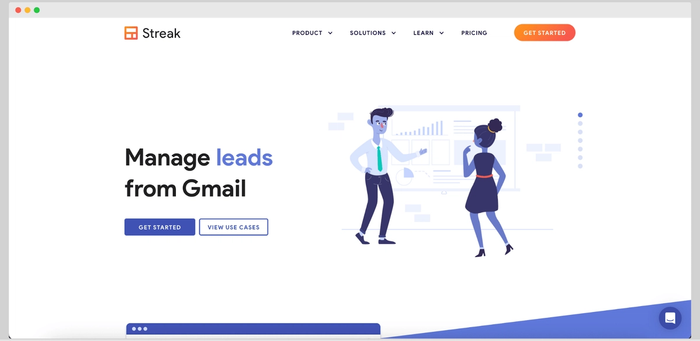
Another option for Gmail fans is Streak. It’s built for startups that want a CRM experience without leaving their inbox.
Key features for startups
- Build and manage sales pipelines directly within Gmail
- Use email tracking, scheduling, and mail merge without extra tools
- Speed up routine outreach with email templates
Pricing:
A free plan is available for basic pipelines and tracking. Paid plans start at $15 per user per month with expanded features and mail merge.
Considerations:
- Only works with Gmail, so not suitable if you use a different email platform
- Analytics and automation are minimal compared to dedicated CRMs
- May feel limiting for teams needing more than simple pipeline tracking
- Better for early-stage or solo founders than for growing teams needing depth
Conclusion
Startup life is packed with big ideas and constant changes, but that pace comes with a messy side. Customer info ends up in random docs and small teams spend hours fixing things that could run smoother.
Most startups don’t have the luxury of time or extra hands – every minute spent sorting out details is a minute not spent building your vision. Capsule brings scattered customer data, to-dos, and opportunities into one clear view. That way, you can focus on moving your business forward, instead of playing catch-up.
Start with Capsule today and build a strong foundation for your business.




